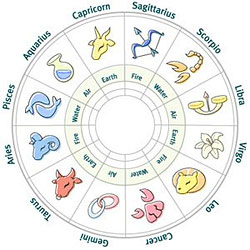As long as I have been alive, I have seen astrological signs in magazines and newspaper to help determine how one’s day will be and how they should act in their life, what to avoid, etc. As a little girl I always thought that horoscopes were really awesome and I would always read mine. On the astrological chart, I am an Aquarius, and apparently according to the science can help explain why I am the way I am. So how the stars connect can reflect on what my personality and future will be like? Huh?
As I grew up, I heard multiple times that horoscopes were not accurate and should not be used to interpret our lives, and neither should any type of astrology. For this reason, I wanted to look into what goes in to astrological signs and whether or not astrology in general should be addressed as a legit form of science.
According to the dictionary, the definition of astrology is “the study of the motions and relative positions of the planets, sun, and moon, interpreted in terms of human characteristics and activities.”
So, by definition astrology as a scientific study relates to motions and positions of the planets, sun and moon and how those astronomical links could possibly be linked to how humans react and interact with each other on planet earth. To help determine whether or not astrology should be considered credible scientific study, the The University of California Museum of Paleontology in Berkeley looks at it from several important views listed below.
- Focuses on the natural world?
- Aims to explain the natural world?
- Uses testable ideas?
- Relies on evidence?
- Involves the scientific community?
- Leads to ongoing research?
- Researchers behave scientifically?
The museum looks at these factors to determine, almost as a checklist, whether or not a study or type of science is valid in its practice. The museum comments on the ideas that astrology does in fact focus on the natural world, because it has to deal with the planets and how they interact with the earth, which would be considered a natural aspect. The also would agree with the idea what astrology aims to explain the natural world; how humans are affected by the natural elements of the sun, planets and moon. They state that astrology’s goal is to “generate predictions and explanations for events on Earth and human personality traits.” As an example, the museum states that “some forms of astrology predict that a person born just after the spring equinox is particularly likely to become an entrepreneur (Berkeley).
One thing that the museum varies on whether or not astrology is a testable science. To explain this statement more clearly, below is the direct quote from the article
Some expectations generated by astrology are so general that any outcome could be interpreted as fitting the expectations; if treated this way, astrology is not testable. However, some have used astrology to generate very specific expectations that could be verified against outcomes in the natural world. For example, according to astrology, one’s zodiac sign impacts one’s ability to command respect and authority. Since these traits are important in politics, we might expect that if astrology really explained people’s personalities, scientists would be more likely to have zodiac signs that astrologers describe as “favorable” towards science.1 If used to generate specific expectations like this one, astrological ideas are testable.
In addition, they also comment on the fact that “In the few cases where astrology has been used to generate testable expectations and the results were examined in a careful study” the evidence given in the studies did not support the validity of astrology as a science. And the checklist from the museum mentions that “scientists often test ideas that turn out to be wrong,” but “one of the hallmarks of science is that ideas are modified when warranted by the evidence,” and make it very clear that studies in Astrology have not tried to alter the ideas they present by reacting to the “contradictory evidence” that is often presented in such studies.
Lastly, the article discusses the last three ideas on the “science” checklist, whether or not the science involves the scientific community, it leads to ongoing research, and if researchers behave scientifically. “Scientific studies involving astrology have stopped after attempting and failing to establish the validity of astrological ideas,” and so far “there are no documented cases of astrology contributing to a new scientific discovery,” which would conclude that astrology as a science fails by continuing to do valid research in its field. Moreover, the article also concludes that the astrological community almost always avoids or ignores contradictory evidence that is presented by other scientists. Doing this as a field of science is not good, because normally science, as we learned in class, is always and must be open to skepticism and be able to evolve with the times and new information. Studies in astrology are also rarely or credibly shared, which gives a lack of validity and would more than likely be thoroughly inspected by the rest of the scientific world (Berkeley).
Overall, looking at astrology as a whole and it’s lack of valid contribution to science, I wonder what the area of study has truly contributed to science throughout history up until now. The lack of credible evidence towards the relationship between the sun, moon, and planets and how humans will behave leads me and most of the scientific world to believe that astrology should not be taken very seriously. If they eventually find more sufficient evidence to help conclude their studies, maybe then astrology will have substance in the scientific world.
But even so, now that it is pretty clear that astrology is not a reliable way to ask scientific questions, my final question ponders why then do humans love astrology and reading about their signs? Why did I find it so interesting as a little girl? Sound off your thoughts below!



